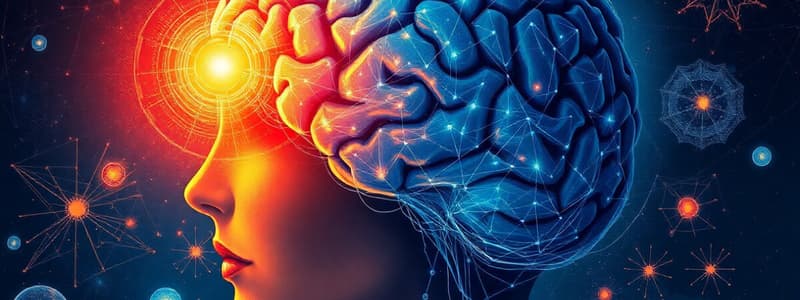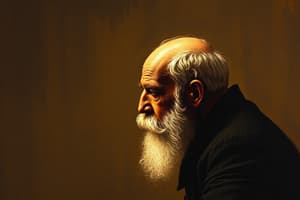Podcast
Questions and Answers
What is intelligence according to the boring definition?
What is intelligence according to the boring definition?
Intelligence is whatever intelligence tests measure.
According to early theories, intelligence was thought to be linked to:
According to early theories, intelligence was thought to be linked to:
- Emotional understanding
- Creativity
- Sensory abilities (correct)
- Memory skills
Helen Keller is cited as an example of individuals who show a strong connection between sensory abilities and intelligence.
Helen Keller is cited as an example of individuals who show a strong connection between sensory abilities and intelligence.
False (B)
What are the core intelligence abilities identified by experts by 1921?
What are the core intelligence abilities identified by experts by 1921?
What does general intelligence (g) refer to?
What does general intelligence (g) refer to?
What is fluid intelligence?
What is fluid intelligence?
Match the types of intelligence with their descriptions:
Match the types of intelligence with their descriptions:
What does the Dunning-Kruger Effect illustrate?
What does the Dunning-Kruger Effect illustrate?
Theories of intelligence were primarily proposed by diverse individuals from various backgrounds.
Theories of intelligence were primarily proposed by diverse individuals from various backgrounds.
Flashcards are hidden until you start studying
Study Notes
Defining Intelligence
- No agreed-upon definition of intelligence
- Boring's definition: intelligence is what intelligence tests measure
- Key questions:
- Is intelligence one ability or multiple?
- Is intelligence exclusive to humans?
Early Theories of Intelligence
- Francis Galton (1890s):
- Believed intelligence stemmed from sensory abilities
- Tested 9,000 individuals, no strong link found between sensory abilities and intelligence
- Helen Keller (blind and deaf) is a counterexample - highly accomplished
Binet & Simon (1905)
- Developed first intelligence test
- Defined intelligence as higher mental processes and abstract thinking
- Intelligence test development marked beginning of IQ testing
- By 1921, experts identified key intelligence abilities:
- Abstract reasoning
- Adapting to new environments
- Acquiring knowledge
- Learning from experiences
General vs Specific Abilities
- Charles Spearman (1927):
- Proposed general intelligence (g): overall cognitive ability
- Specific intelligence (s): abilities specific to certain tasks
- Thurstone (1938):
- Argued against "g"
- Proposed primary mental abilities:
- Verbal comprehension
- Word fluency
- Numeric ability
- Spatial visualization
- Associative memory
- Perceptual speed
- Inductive reasoning
Fluid vs Crystallized Intelligence
- Cattell & Horn (1940s/1960s):
- Fluid intelligence: ability to solve novel problems, think abstractly
- Crystallized intelligence: accumulated knowledge, facts, and experiences
- Fluid intelligence transitions into crystallized intelligence over time
Multiple Intelligences
- Gardner (1983, 1999):
- Many ways to be intelligent, various intelligences are distinct and independent
- Examples: linguistic, spatial, musical, kinesthetic
- An "intelligence" is:
- Distinct ability, independent from others
- Likely an evolutionary advantage
- Some people may be exceptional in only this specific area
- Critiques:
- Are these truly "intelligences" or just talents?
- Independent nature of abilities is questionable
- Some categories lack clear falsifiability (proof)
Triarchic Model (Sternberg 1983, 1988)
- Three types of intelligence:
- Analytical intelligence ("book smarts"): logical reasoning, problem-solving
- Practical intelligence ("street smarts"): handling everyday tasks
- Creative intelligence: thinking of novel solutions
- Critique: Components may not be as independent as claimed, potentially linked to 'g'
Neurological Bases of Intelligence
- Intelligence linked to different brain regions:
- Frontal lobe: executive function, planning, impulse control
- Prefrontal cortex: thinking, planning, language; active during 'g' tasks
- Temporal lobe: auditory processing, memory
- Parietal lobe: spatial abilities
- Occipital lobe: visual-spatial processing
- Processing speed:
- Reaction time: faster reaction time often linked to intelligence
- Working memory: related to many intelligence measures
Summary of Intelligence Theories
- Intelligence likely involves a general factor ('g') with subtypes that cluster together
- Definitions of intelligence differ across cultures and are influenced by education
Studying That Suits You
Use AI to generate personalized quizzes and flashcards to suit your learning preferences.




